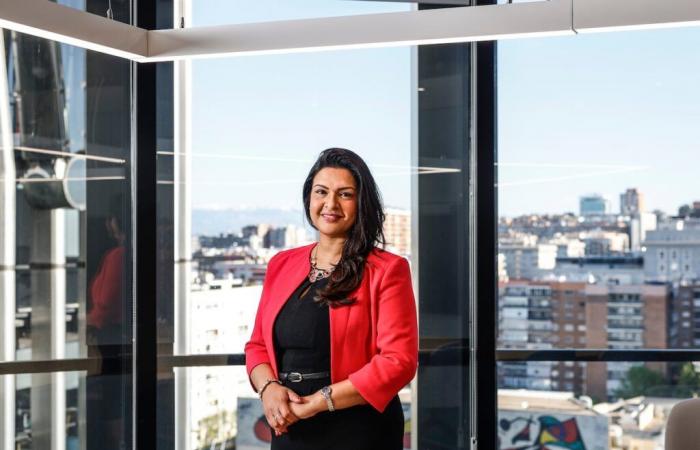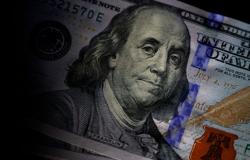
The crises wore each visit from Ritu Vohora to Madrid. The global macro strategist of T. Rowe price, an asset manager based in Maryland (USA) that manages 1.6 billion dollars, came to the capital for the last time in February 2020, with the pandemic appearing, and has returned five years later, in full chaos in the markets by the tariffs, in the middle of an international tour to speak with customers. Of Indian origins but born in Nairobi (Kenya), where she lived until she was 18, Vohora returns to her African home twice a year. And he isolates himself from the changes of the financial industry painting and taking his camera. “In a world loaded with the stress of financial markets and data, for me it is a really pleasant escape to simply create something beautiful and take good photographs,” he says.
Ask. How would you describe the current moment for the market?
Answer. Volatile, uncertain and unpredictable. After the elections there was a lot of euphoria for what Trump 1.0 meant for the markets. But it is being different, it has gone much further in its tariffs, which are ultimately attacks on consumers. In the case of immigration, it will reduce the job offer, and we will see many less migrant workers arriving. It is important because salaries could rise and that could be inflationary. Uncertainty is affecting the feeling of investors and making the activity fall. Companies do not know whether to spend. They don’t know if hiring. Whatever happens with tariffs, even if you turn back, they will leave permanent scars. It has been an incredibly volatile period. And that is now feeding concerns, not only about the risk of recession in the United States, but also about potentially higher inflation.
P. What has you told customers?
R. What I have been telling you is: look, we cannot predict a result. And I think we have to be humble and recognize that we do not know what the US government is doing. Therefore, instead of trying to predict a result, it is better to analyze potential scenarios and its probabilities. It’s about thinking: if this is a prolonged period of greater inflation, how do we cover the risk of inflation? If there is a risk of recession or a shock Growth, how can we protect ourselves from that risk? And if we are concerned about the excessive concentration in the United States and perhaps the end of exceptionalism in that country, how can we protect ourselves from that? In short, what we are thinking about our clients is how do we build a portfolio that can be more resistant, even in a period of greater volatility?
P. Have you transmitted nervousness?
R. There is a mixture of feelings, but it is reassuring that customers are not panic. There is too much uncertainty to be able to make clear decisions. In the case of T.Rowe Price and some of the clients I have spoken with, we still assume a certain risk, but we are lowering our exposure to the US to reduce them. The last thing they want is to react impulsively at the least indicated moment. You don’t want to sell at the lowest point. Most seek how to protect the wallet. A defensive and quality approach. In Variable Income they look for companies with fundamental and solid balances, visibility of profits and price fixing power. Because if we are in a world of greater inflation, companies that have pricing power can move those costs to consumers and protect their margins.
P. What products are incorporating into the wallet to cover risks?
R. What we are saying is: if you are concerned about the risks of growth, you should have short -term American treasure bonds, not in the long term, because we are concerned that long -term prices will rise. If you are worried about shock Inflationist, American treasure bonds are not going to help you. Then, in that scenario, you have to think about things like bonds linked to inflation, which we have been incorporating. Like actions, raw materials, or real assets that can provide some coverage against inflation. And then we are also thinking of assets such as safe refuge coins, such as the euro, the Swiss Franco, the Yen and also to have some cash. Because now we will have great purchase opportunities. So, having some liquidity is not only a kind of mattress, but it is also capital ready to invest. I think it makes sense at this time.
P. And gold?
R. In 2022, the dollar was the only asset that worked before a shock Inflationary This time, because people are worried about the dollar, we are seeing that they finally opt for assets such as gold and the Swiss Franco. The other reason we have seen strength in gold is that China has been buying a lot to diversify beyond the dollar. But we must think about the role of gold in a wallet. Many people see it as protection against inflation or, in the worst case, a recession. For us it is above all an authentic diversifier for those who look for something a bit different from actions and bonds. However, our assumptions about the capital market for the next five years do not make us see a great return from gold. So from the point of view of the construction of a portfolio and a risk management perspective, it is worth having some gold as diversifier, but I do not consider it a key factor of the performance of a portfolio.
P. Dividend actions have the psychological component of giving income even when everything falls. Does that matter?
R. Yes, I think it still matters. Companies with growing dividends could do well in this environment, because at this point the quality matters a lot. And that income you said introduces a little defensive nature in the portfolios. If we have a traditional -style recession, we already know that basic consumer goods, public services and health care can provide coverage. In fact, health is an issue that we like a lot and we are also very excited about innovation. For example with Eli Lilly’s oral medication for diabetes and weight loss. Last week they had a phase three essay that went well. The risks were minor and their users lost weight. If you get approval, this could change everything. And although we could have pharmaceutical tariffs that affect quality companies, this company will have a great growth of profits from this tablet.
P. Geographically, what areas do they seem more attractive?
R. At this time we are neutral in the US, and we are reducing our weighting in Europe due to growth deterioration. In the medium term we think that Europe is really interesting, because the fiscal stimulus that we will see will change the rules of the game, but that will not happen for at least a year. We are guiding ourselves towards Japan, but also towards emerging markets. In India we were quite underpathed because it was very expensive, but now we are investing because the valuations are attractive. The American vice president JD Vance was there this week, and there will probably be a commercial agreement with India. In addition, it has strategically become much more important. Now they have a seat on the world board and can take part in the place of China. Other markets that we like are Indonesia and the Philippines, which are more domestic markets with fantastic companies, and although Trump imposed tariffs initially, we believe they will be negotiated. We still like Vietnam, but it is a country that we are going to observe closely, in particular considering what Trump does with the tariffs there.
P. Has the worst for markets happen?
R. It is very difficult to secure it. But we have seen that Trump has been watching the bond market. When they do not like certain policies, bond yields shoot. So the bond guards will tell you when it has gone too far. The point is that we don’t really know what your plan is. If there are some immediate commercial agreements with countries such as India, Japan, perhaps the United Kingdom and probably the EU, everything can remain in a slowdown in growth. The second scenario is whether the agreements take months. Besent said this week that he could take two to three years close a commercial agreement with China more scope. It would be a prolonged period of greater uncertainty, which could bring a mild recession. Finally, in the worst case, if Trump really believes in tariffs and is really thinking about restructuring trade and recovering production in the US, that would lead to structurally higher tariffs for longer. In that case, we probably enter a ugly recession. That is not our base scenario. I think we are at some intermediate point, where we will get some commercial agreements, but there will still be a lot of uncertainty.
P. Can the markets discipline Trump?
R. Honestly, I don’t think the market knows how to react. And I think that this year they are breaking traditionally settled correlations. If we analyze gold, we see that you have obtained better results at a time when the yields are rising. Historically, that is not the case. But we have also had a period of excessive risk aversion. And it could be said that when the shares fall, people turn to the safe refuge of the US treasure bonds or the dollar. And it is very rare that the dollar is falling and the yields of the American treasure bonds rise in a moment of risk aversion. It is a scenario that we have never had. Bond markets are considering issues such as the independence of the Federal Reserve. Because if that changes, the status of safe refuge and credibility of US institutions change. Securities markets, of course, are not only concerned about the risk of recession and greater inflation. What does this mean for the margins? In particular, if we observe sectoral tariffs, in areas such as pharmaceuticals and semiconductors. There are fluctuations for a change of narrative.





